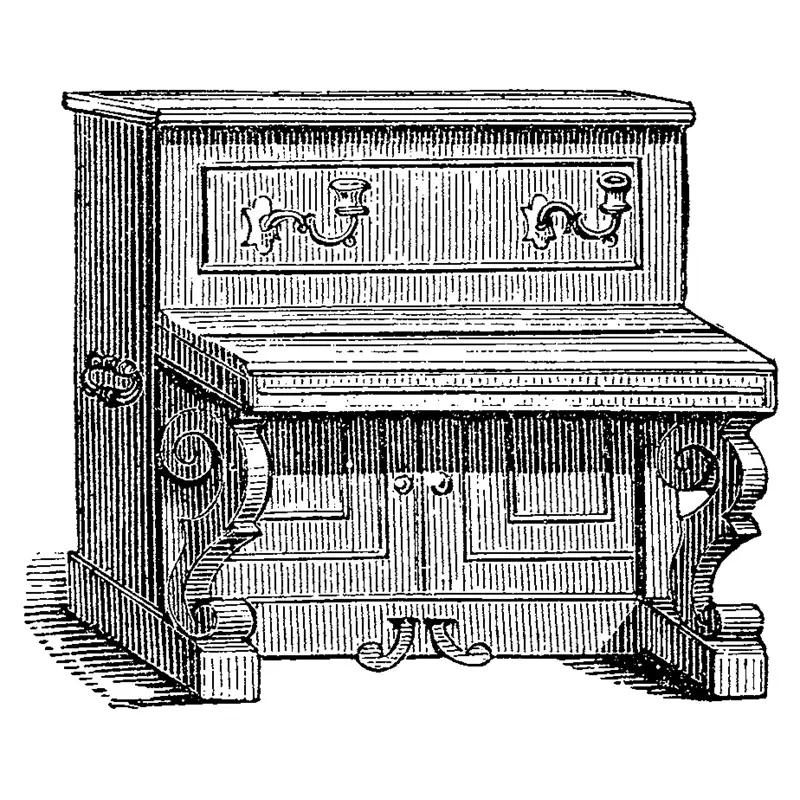“One-Leg” Willie Joseph

When one thinks of the rollicking piano style known as boogie-woogie, Boston doesn’t come to mind. The genre – characterized by a strong rhythmic beat in the left hand and a contrasting melody in the right – first came to prominence in 1928 when Clarence “Pine Top” Smith recorded “Pine Top’s Boogie Woogie.” Smith was well-traveled – he grew up in Alabama, started his entertainment career in Pittsburgh, and died of a gunshot wound in Chicago – but it is doubtful that he ever spent time in the Bay State.
There was, however, an earlier pianist born in Boston who played in the manner heard in “barrelhouse” bars in the South, even though he was trained in the classical tradition at a local conservatory: William Joseph, Jr., better known as One-Leg Willie.
Very few facts are known about Joseph; he died before the development of recording technology, and accordingly we have to depend on others’ words as to his talent. Most of that comes from the recollections of his fellow African-American pianists, who held him in awe. Eubie Blake called Joseph “the greatest player he ever heard,” and Willie the Lion Smith said that he was the only pianist he’d pay money to watch.
EARLY YEARS, BOSTON CONSERVATORY TRAINING
Joseph was, according to They All Played Ragtime by Rudi Blesh and Harriet Janis, “a little older than” Eubie Blake, born in 1883. A William Joseph, Jr. was born in Boston on August 24, 1877 to Afro-Portuguese parents, and it is speculated that this man – six years older than Blake – is One-Leg Willie. Joseph Jr. was raised in Boston and grew to be six feet tall according to a 1905 account in The New York Sun. He lived with his mother in the home of a wealthy white family, for whom she was housekeeper.
Joseph began to play the piano in the house where they lived, and when his mother’s employer heard him one day he was sufficiently impressed to pay his way to Boston Conservatory, founded in 1867, one of the first institutions of higher education to grant admission to Blacks. There, Joseph received instruction at a much higher level than was typical of ragtime and boogie-woogie pianists, many of whom had only rudimentary skills. Joseph, by contrast, was said by Black vaudevillian Tom Fletcher “never to have played the same number the same way twice. He would play the same melody with different harmony. His fingers and brain seemed to work like lightning.”
CAREER, PIANO-PLAYING CONTESTS
Joseph had been an expert skater but had a leg amputated after he injured it in a fall at a skating rink, the first of a succession of misfortunes that gave him a jaundiced view of life. He took to the road, traveling to Atlantic City, New Jersey, where there was, according to Fletcher, “plenty of work for piano players during the summer.” When Fletcher wrote his recollections of Joseph in the mid-1950s, he said Joseph subsequently moved to Hartford before trying his luck in New York City. There, he got a job at a dance hall, where his playing was so fulsome he was said to be not just a pianist, but an orchestra.
In Joseph’s day, piano players were often pitted against each other in contests by promoters, and he was consistently victorious. In one, he played “The Star-Spangled Banner” – which would not become the national anthem for more than a decade – and “ragged” the tune, laying down a bass beat against which he syncopated the now-familiar melody. He took first prize, a gold medal he pinned on his coat, and over the course of his career he would win so many more that they hung down his front like a rope ladder. Even that impressive display understated his record as he was known to hock his medals when he needed money. Joseph was “famous for his disreputable attire at a time when fancy dressers were the rule,” so unlike other pianists who dressed to impress, he spent the money on more basic needs.
Eubie Blake said that Joseph was “the only Negro to graduate from his class,” finishing his studies at Boston Conservatory in two-and-a-half years. In his last year, he was pitted against four other pianists in a blind competition, with the five contestants hidden in cubicles from seven judges. Joseph played Liszt’s Hungarian Rhapsody no. 2 and was told by the judges that they considered him the best. Blake said Joseph could play anything perfectly, from ragtime to the most difficult concert pieces, but his audiences wanted to hear the lively new style of African-American piano, not stiff European pieces. “We’d go to somebody’s house to play and start something classical,” Blake recalled, “and they’d say, ‘Come on man, play something boogie.’” Blake said Joseph “got disgusted and changed from classics to ragtime.”
ODD JOBS, DEATH, LEGACY
Despite his virtuoso skills, Joseph had to scuffle and take odd jobs to survive. He was listed as a musician and music teacher in the 1909 Baltimore City Directory, and in 1910 he may have been back in Boston living in rooming houses and working part-time as a cook while playing the piano in Scollay Square, the city’s entertainment district since demolished to make way for Government Center.
He was last seen in Atlantic City one summer towards the end of the first decade of the 20th century. He died embittered in Virginia, his life shortened by the liquor and narcotics he used to salve his sense of thwarted promise.
His work lives on in the playing of others, however. “The piano styles we now know as boogie-woogie, walking bass, and such were all played by Willie,” Fletcher wrote. The genre served as a bridge to rock ‘n’ roll, with Joe Turner sparking a boogie-woogie craze in the late 1930s that carried over into his seminal mid-‘50s hits. Boogie-woogie is a hardy perennial, re-surfacing from time to time in the sounds of white artists as different as the Andrews Sisters and Merle Haggard. Willie only had one leg, but with his two hands he laid the foundation for much of popular music today.
(by Con Chapman)
Con Chapman is the author of Rabbit’s Blues: The Life and Music of Johnny Hodges (Oxford University Press, 2019), Kansas City Jazz: A Little Evil Will Do You Good (Equinox Publishing, 2023) and Sax Expat: Don Byas (University Press of Mississippi, 2025).


